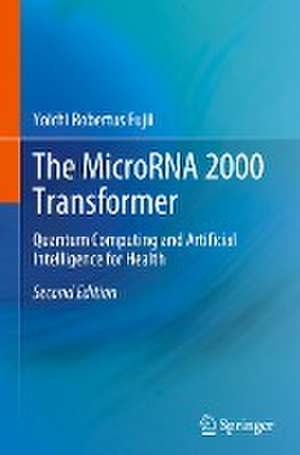The MicroRNA 2000 Transformer: Quantum Computing and Artificial Intelligence for Health
Autor Yoichi Robertus Fujiien Limba Engleză Hardback – 15 sep 2023
As predicted in the first edition, diseases can be predicted using the miRNA memory package (MMP) and miRNA entangling target sorting (METS), which could clarify the etiology of human diseases. Because researchers are investigating the relationship between circulating miRNAs and human diseases to develop new medicines, miRNA deep sequencing and detection methods will be high-speed and clever. The microRNA 2000 Transformer - Quantum Computing and Artificial Intelligence for Health is aimed at intermediate and advanced scientists, clinicians, students, and science enthusiasts. The Author hopes to lay the groundwork for future human health innovation.
Preț: 1038.14 lei
Preț vechi: 1092.78 lei
-5% Nou
Puncte Express: 1557
Preț estimativ în valută:
198.64€ • 207.40$ • 164.41£
198.64€ • 207.40$ • 164.41£
Carte disponibilă
Livrare economică 14-28 martie
Preluare comenzi: 021 569.72.76
Specificații
ISBN-13: 9789819931644
ISBN-10: 9819931649
Pagini: 233
Ilustrații: XV, 233 p. 1 illus.
Dimensiuni: 155 x 235 mm
Greutate: 0.59 kg
Ediția:2nd ed. 2023
Editura: Springer Nature Singapore
Colecția Springer
Locul publicării:Singapore, Singapore
ISBN-10: 9819931649
Pagini: 233
Ilustrații: XV, 233 p. 1 illus.
Dimensiuni: 155 x 235 mm
Greutate: 0.59 kg
Ediția:2nd ed. 2023
Editura: Springer Nature Singapore
Colecția Springer
Locul publicării:Singapore, Singapore
Cuprins
1 Quantum Computing and Artificial Intelligence for MicroRNAs.- 2 Oxford MiRNA Gardener.- 3 Mobile MicroRNAs: Potential for MicroRNA Biogenesis.- 4 Food XenomiRNA Arise: MicroRNA Storm and Space.- 5 Exosomal MicroRNAs as Brain Memory DeviceDevices.- 6 Programmed Evolution by MiRNA Memory.- 7 Communication in MiRNAs between Inflammation and Cancer.- 8 The Concept of “Virus” is the Same as Exosomal MiRNA Gene.- 9 ES Cells or iPS Cells, that is the Question.- 10 MIRAI” Healthcare: “Future” in Japanese.- 11 Deep Learning of MiRNAs for Therapeutic Applications.- 12 Inflammatory Bowel Disease and Rheumatoid Arthritis.
Notă biografică
Dr. Yoichi Robertus Fujii, MDV PhD
Dr. Fujii YR graduated from Hokkaido University, Japan. He was a lecturer at Nagoya University School of Medicine, a scientific officer at Oxford University, Institute of Virology, and an associate professor at Nagoya City University. He has more than 70 peer-reviewed international publications. He founded The Society of Retrovirology Research Community and The Society of MicroRNA in Japan. He was a member of the New York Academy of Science and the American Association of Microbiology.
Dr. Fujii YR graduated from Hokkaido University, Japan. He was a lecturer at Nagoya University School of Medicine, a scientific officer at Oxford University, Institute of Virology, and an associate professor at Nagoya City University. He has more than 70 peer-reviewed international publications. He founded The Society of Retrovirology Research Community and The Society of MicroRNA in Japan. He was a member of the New York Academy of Science and the American Association of Microbiology.
Textul de pe ultima copertă
The second edition includes new findings that were only a theory in the first edition, clarifying what is beginning to be proven true. All chapters have been updated, and new data on the analysis of major depressive disorder from exosome microRNA (miRNA) in plasma, traumatic brain injury, and Alzheimer's disease, brain glioma from cerebrospinal fluid miRNA, liver cancer, induced pluripotent stem (iPS) cell tumorigenesis, and other topics have been added.
As predicted in the first edition, diseases can be predicted using the miRNA memory package (MMP) and miRNA entangling target sorting (METS), which could clarify the etiology of human diseases. Because researchers are investigating the relationship between circulating miRNAs and human diseases to develop new medicines, miRNA deep sequencing and detection methods will be high-speed and clever. The microRNA 2000 Transformer- Quantum Computing and Artificial Intelligence for Health is aimed at intermediate and advanced scientists, clinicians, students, and science enthusiasts. The Author hopes to lay the groundwork for future human health innovation.
Caracteristici
Aims to understand disease in terms of quantum, which was previously only understood in terms of genetic mutations Proposes using quantum to predict and treat illnesses triggered by the environment such as traumatic brain injury Tries to understand humans using quantum and a panel of microRNAs to diagnose cancer, infectious diseases, etc
